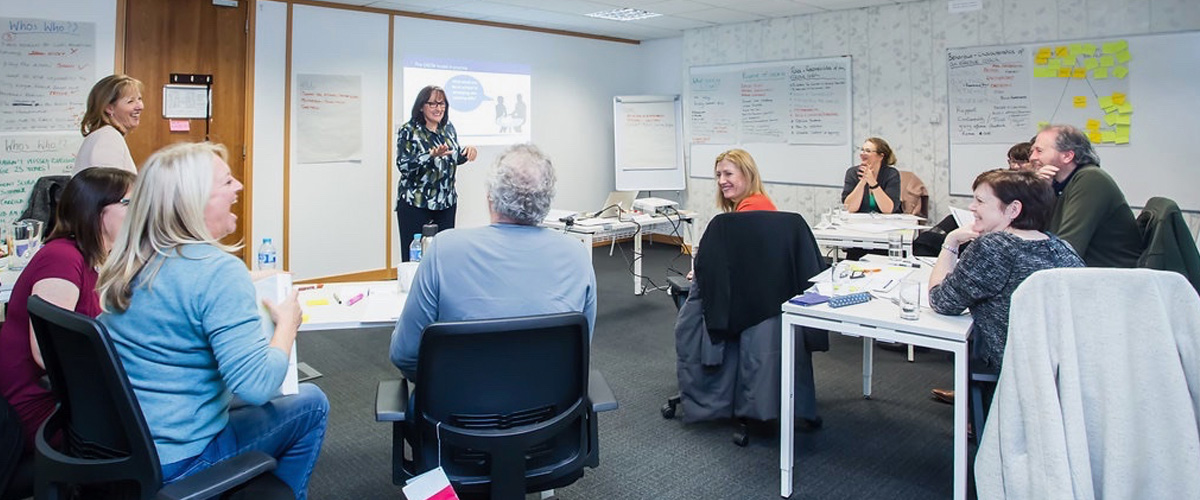I am writing this a month into the Covid-19 lockdown. It’s a new reality which took us all by surprise.
When we were all planning New Year’s resolutions and thinking about goals for the year, personal or professional, no one could have foreseen that by March 23rd, we would be living in this lockdown situation.
We have all had to adapt fast, at home and at work. This photo of us running a recent, face-to-face training programme seems like a lifetime ago at the moment.
Many articles have been written about how to move forward into the new normal: I think the Panic, Pause or Pivot model provides a great guide to how we can respond.
A question for you: when the lockdown was announced, how did you react?
Probably in one of three ways, or more likely, a combination of all of them.
Did you?
- PANIC?
The answer to this one is probably a big resounding YES. I think, to a greater or lesser degree, we all panicked when we heard the news. The shock of suddenly being told to stay at home led to so many unknowns for all of us. What on earth were we going to do? How would we manage? What was going to happen next? My youngest son is in year 13. Suddenly schools were closed, and A Levels were cancelled. Holidays and socials were postponed and the way we live and work changed instantly. No one could quite believe it. From a personal perspective, as a small training and coaching consultancy, paid dates disappeared out of our diary almost immediately.
It has been easy to feel overwhelmed by the enormity of the situation, constantly checking the news and feeling rising anxiety. Many of us have felt very emotional, unable to sleep.
This leads to feelings of fear and uncertainty and a desire to rush around, making decisions which perhaps won’t serve us well in the longer term, because we just want to do something. We all saw examples of people panic buying loo roll, hand sanitisers and, apparently, tinned tomatoes, and most of us got caught up in this and bought the same, because everyone else was, just in case.
Was this you?
- PAUSE?
For others, the uncertainty has made it tempting to just stop, do nothing and wait for everything to pass. Certainly, in our house when we first heard the news, we just sat and stared at the television.
One friend runs a photography business, and for her, everything stopped, just like that: all shoots cancelled for the foreseeable future. Other colleagues have been furloughed and not allowed to work. How can we respond when our diaries suddenly empty and our busy lives suddenly grind to a halt?
It is easy for our days to become unstructured and unproductive. We literally don’t know what to do, so we do nothing.
Is this you?
- PIVOT
There is a third option and it has been amazing watching some businesses do this quickly and successfully. In the business world, the term ‘pivot’ originates with Eric Ries, author of The Lean Startup, 2012. He defines it perfectly as ‘a change in strategy without a change in vision.’
It means taking a positive approach, keeping moving and responding to circumstances by changing how you do what you do. We watched our local pub turn into a takeaway almost immediately, and then change again into a meal delivery service, within the space of a week. They still provide the same meals, but they offer their service in a totally different way. That is a pivot. While your competitors either panic or pause, you take stock, dig deep for creativity and keep moving, changing to survive.
This is about concentrating on what we can influence, control and change, and trying to shift our focus away from eveything outside our control which can so easily cause us to panic or pause.
Here at ESB Training, we have had to pivot, and do it fast. Since the news first came out, we’ve definitely had moments of panic, as everyone undoubtably has. In business terms, sometimes I have wondered how we will ever get through and whether we will have a business at all at the end of this. We also definitely paused: for several days, we stopped and thought. We didn’t want to be that proverbial headless chicken, rushing around making changes that we would only have to reverse the next day. And our clients definitely panicked and paused too, adding to the general feeling of discombobulation.
However, then we started to plan. We specialise in engaging, bespoke, face-to-face classroom-based workshops. What could we do now? How could we adapt our offering whilst still keeping the essence of what has made us successful? We aren’t e-learning specialists. We don’t have the technical skills and the infrastructure behind us to convert our programmes to e-learning and there are many companies with excellent offerings who we could never complete with. But the technology does exist now for running virtual workshops, and this is the direction we decided was best for us, to maintain the essence of our service, offered in a totally new way.
Fast forward three weeks and we have rewritten our programmes and have started running interactive, group training workshops via Zoom which has been a revelation. If you had asked me a month ago whether we could run our workshops virtually, I would have said it wouldn’t work, because the face to face aspect is so important. Yes, it is and always will be, but that just isn’t an option at the moment, and to my amazement, they have worked really, really well. Our clients have also been through this process of pivoting too, accepting new approaches as they seek to engage their employees and ensure they feel invested in, valued and connected.
Our flagship programmes are qualifications for the Institute of Leadership & Management, and we are proud to now to offer our popular ILM Level 3 Award in Leadership & Management in a totally virtual format. Learners can join a cohort and work in a group environment, or join independently and complete assignments at their own pace, using pre-recorded Zoom sessions. I can’t quite believe we have managed to do this. It has been one of the steepest learning curves we have ever been on, but the sense of purpose and focus has been amazingly motivating and I now have confidence that we will have a business when we reach the other side, and will be stronger and more versatile as a result.
You may have panicked: that’s unsurprising
You may have paused: that totally understandable
But have you made a pivot? Can you take control, make some changes and keep moving forward?
If we can do it, you can too.
Good luck!
We know that having structure and purpose can be so helpful for people right now. If you’ve been furloughed or aren’t working, or if you’re a student and want to enhance your career prospects, then we can help you use your time at home as profitably as possible and gain a respected qualification.
ILM Level 3 in Leadership & Management: now run virtually
Find out more here
Please message us at hello@esb-training.co.uk
We have a special launch discount too, as we know finances are tight for everyone at the moment.


